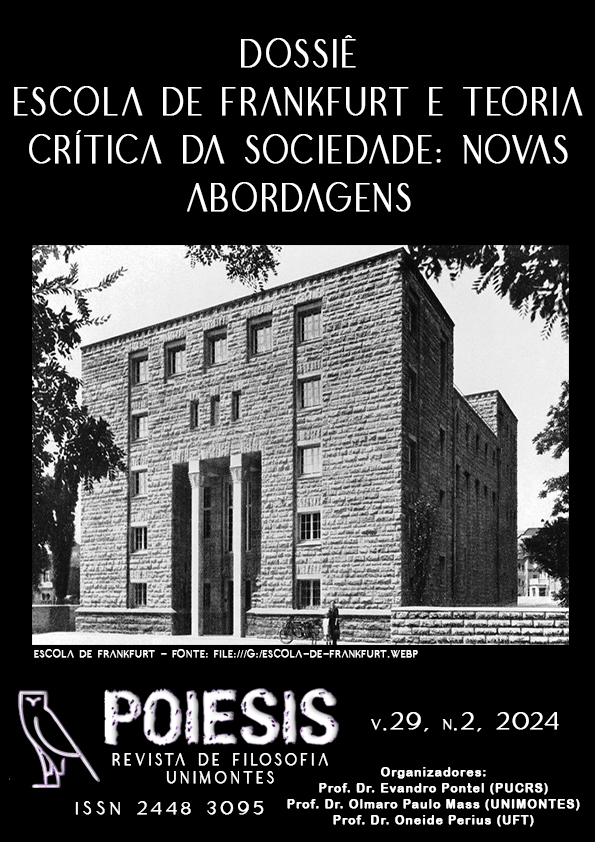NATURRECHT ALS REVOLUTIONÄRE GEWALT? SPINOZA UND BENJAMIN – EINE KREUZLEKTÜRE
DOI:
10.46551/2448-30952024v29n208Resumo
Recent interpretations have shown that the cryptic reference to Spinoza’s doctrine of natural law in Benjamin’s “Zur Kritik der Gewalt” conceals a deeper convergence between the two thinkers. Both Spinoza and Benjamin take the position that no constituted legal order (potestas) can completely neutralize the violence that constitutes it (potentia). In this article, we also show that Benjamin’s “Der Ursprung des deutschen Trauerspiels” demonstrates the same precariousness of the sovereign (against Carl Schmitt) as Spinoza’s critique of monarchical regimes in the “Tractatus Politicus”. The nonneutralized violence that challenges every constituted sovereignty can, however, take on a “lawdestroying” form in Benjamin's work. The article concludes with the question of whether such a “destitution of the law” can also be found in Spinoza.
Downloads
Referências
AGAMBEN, G. 2004. Ausnahmezustand (Homo sacer II.1) (Frankfurt a.M.: Suhrkamp)
BENJAMIN, W. 1974a. Der Ursprung des deutschen Trauerspiels. In: Gesammelte Schriften I.1 (Frankfurt a.M.: Suhrkamp), 203-430.
BENJAMIN, W. 1974b. Geschichtsphilosophische Thesen. In: Gesammelte Schriften I.2 (Frankfurt a.M.: Suhrkamp), 691-703.
BENJAMIN, W. 1977. Zur Kritik der Gewalt; in: Gesammelte Schriften II.1(Frankfurt a.M.: Suhrkamp), 179-203.
BODDE, E.R. 2019. Benjamin and Spinoza: Divine Violence and Potentia. In: “Eidos. A Journal for Philosophy of Culture”, Vol. 3, no. 2 (8): 75-90.
CARBONE, G. 2016. Il problema della violenza nel Trattato Teologico-Politico di Spinoza. In: “Polemos. Materiali di filosofia e critica sociale”, Anno IX, no. 2: 106-132.
CARRÉ, L. 2014. Benjamin spinoziste? Droit et violence dans le Traité théologicopolitique. In: T. STORME, & Q. LANDENNE (Eds.): L’actualité du Tractatusde Spinoza et la question théologico-politique (Bruxelles: Éditions de l'Université de Bruxelles), 203-216.
HOBBES, T. Leviathan (Hamburg: Meiner).
LORDON, F. 2019. Vivre sans? Institutions, police, travail, argent... (Paris: La fabrique).
MATHERON, A. 2011. L’indignation et le conatus de l’État spinoziste. In: Études sur Spinoza et les philosophies de l’âge classique (Paris: ENS Éditions), 219-229.
PALMA, M. 2019. The Curious Case of Baruch Spinoza in Walter Benjamin’s “Toward the Critique of Violence”. In: “Critical Times”, 2 (2): 221-238.
SCHMITT, C. 2015. Politische Theologie. Vier Kapitel zur Lehre von der Souveränität (Berlin: Duncker & Humboldt).
SCHMITT, C. 2023. Die Diktatur. Von den Anfängen des modernen Souveränitätsgedankens bis zum proletarischen Klassenkampf (Berlin: Duncker & Humboldt).
SPINOZA, B. 2010. Politischer Traktat (Hamburg: Meiner).
SPINOZA, B. 2012. Politisch-theologischer Traktat (Hamburg: Meiner).
SPINOZA, B. 2017. Briefwechsel (Hamburg: Meiner).
SPINOZA, B. 2019. Ethik in geometrischer Ordnung dargestellt (Hamburg: Meiner).
ŽIŽEK, S. 2011. Gewalt. Sechs abseitige Reflexionen (Hamburg: Laika).
ZOURABICHVILI, F. 2002. Le conservatisme paradoxal de Spinoza. Enfance et royauté (Paris: PUF).
Downloads
Publicado
Como Citar
Edição
Seção
Licença
Copyright (c) 2024 Revista Poiesis

Este trabalho está licenciado sob uma licença Creative Commons Attribution-NonCommercial-NoDerivatives 4.0 International License.





.png)

